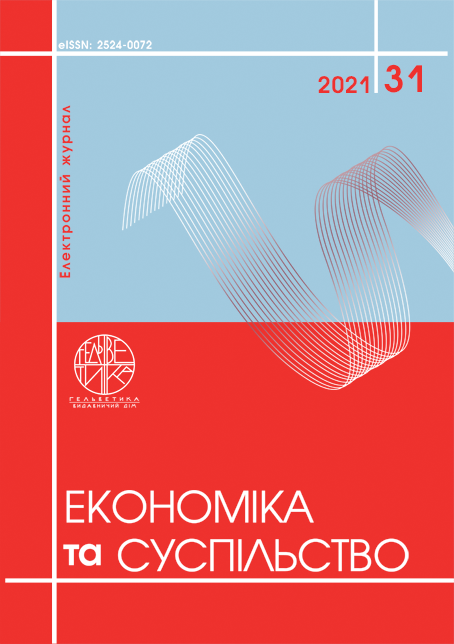SPECIFICS OF TAX POLICY FORMATION IN THE DEVELOPMENT OF THE CARBON TAX
Abstract
The article is devoted to the study of current problems of tax policy of the state in terms of increasing the relevance of carbon taxes and combating climate change. At the same time, the key point is to determine the relationship between tax policy and fiscal pressure and to encourage industrial enterprises to reduce the share of harmful emissions in the production process. It is determined that the carbon tax should have an indirect impact on the financial and economic activities of the enterprise and act not as a directive, but as a stimulating factor to ensure the environmental friendliness of production. It is studied that global trends in the fight against climate change lead to the introduction of a new type of carbon taxes, which regulate access for international companies to certain markets and are expressed in indirect tax pressure on importers. The carbon tax has become particularly relevant in the last decade, when the fight against climate change has become an objective reality for the entire global economy. In this aspect, it is determined that carbon taxes should be divided into two models. According to the first of them, taxation is carried out according to the traditional method, when the fiscal pressure is directed directly to the polluting enterprise, and its size depends on the amount of emissions. The second model is new and is based on the regulation of market access and market prices for goods of enterprises. In terms of strengthening the overall globalization of the world economic system, the second model is more effective and efficient to reduce emissions by economic agents, as it is used as an indirect tax and directly affects the market position of the enterprise. At the same time, the carbon tax according to the second model operates on the principle of "less emissions – less tax", which forces manufacturers to directly regulate environmental standards in the production of their goods in order to ensure the possibility of price competition. It is proposed to use part of the proceeds from the carbon tax to restore the environment, invest in clean energy or research new energy technologies with the involvement of redundant personnel in these areas.
References
Вербівська Л. В. Інвестиційна стратегія соціально-економічного розвитку регіону: зміст і структура. Соціально-економічні дослідження в перехідний період. Інноваційний розвиток економіки : Зб. наук. праць. 2007. С. 3–34.
Вербівська Л. В., Судук І. В. Стратегія забезпечення конкурентоспроможності підприємства та основні принципи її формування. Молодий вчений. 2017. №10. С. 827–833.
Галас Л. І., Дзямулич М. І., Шматковська Т. О. Особливості експортної діяльності сільськогосподарських підприємств в Україні. Економічний форум. 2021. №2. С. 74–79.
Zybareva, O., Kravchuk, I., Pushak, Y., Verbivska, L., Makeieva, O. Economic and Legal Aspects of the Network Readiness of the Enterprises in Ukraine in the Context of Business Improving. Studies of Applied Economics. 2021. Vol. 39(5).
Zybareva O., Verbivska L., Lopashchuk I., Kalaman O., Derkach T., & Smentyna, N Strategically-oriented enterprise management through information systems. International Journal of Recent Technology and Engineering. 2019. Vol. 8(2), 3014–3017.
Lagovska O., Ilin V., Kotsupatriy M., Ishchenko M., Verbivska L. Priority directions of tax policy change in the information sphere. Scientific Bulletin of National Mining University. 2020, Vol. 3.
Stashchuk Olena, Boiar Andrii, Shmatkovska Tetiana, Dziamulych Mykola, Skoruk Olena, Tesliuk Sofiia and Zintso Yuliya. Analysis of fiscal efficiency of taxation in the system of filling budget funds in Ukraine. Ad alta: Journal of interdisciplinary research. 2021. № 1(11), pp. 47–51.
Verbivska L. V. (2007) Investytsiina stratehiia sotsialno-ekonomichnoho rozvytku rehionu: zmist i struktura. [Investment strategy of socio-economic development of the region: content and structure]. Sotsialno-ekonomichni doslidzhennia v perekhidnyi period. Innovatsiinyi rozvytok ekonomiky – Socio-economic research in transition. Innovative economic development, 1, 3–34. (in Ukrainian)
Verbivska L. V., Suduk I. V. (2017) Stratehiia zabezpechennia konkurentospromozhnosti pidpryiemstva ta osnovni pryntsypy yii formuvannia [Strategy of ensuring the competitiveness of the enterprise and the basic principles of its formation]. Molodyi vchenyi – Young scientist, 10, 827–833.
Halas L. I., Dziamulych M. I., Shmatkovska T. O. (2021) Osoblyvosti eksportnoi diialnosti silskohospodarskykh pidpryiemstv v Ukraini [Peculiarities of export activity of agricultural enterprises in Ukraine]. Ekonomichnyi forum – Economic forum, 2, 74–79.
Zybareva O., Kravchuk I., Pushak Y., Verbivska L., Makeieva O. (2021) Economic and Legal Aspects of the Network Readiness of the Enterprises in Ukraine in the Context of Business Improving. Studies of Applied Economics, 39(5).
Zybareva O., Verbivska L., Lopashchuk I., Kalaman O., Derkach,T., Smentyna N. (2019) Strategically-oriented enterprise management through information systems. International Journal of Recent Technology and Engineering, 8(2), 3014–3017.
Lagovska O., Ilin V., Kotsupatriy M., Ishchenko M., Verbivska L. (2020) Priority directions of tax policy change in the information sphere. Scientific Bulletin of National Mining University. Vol. 3.
Stashchuk Olena, Boiar Andrii, Shmatkovska Tetiana, Dziamulych Mykola, Skoruk Olena, Tesliuk Sofiia and Zintso Yuliya (2021) Analysis of fiscal efficiency of taxation in the system of filling budget funds in Ukraine. Ad alta: Journal of interdisciplinary research, 1(11), 47–51.


